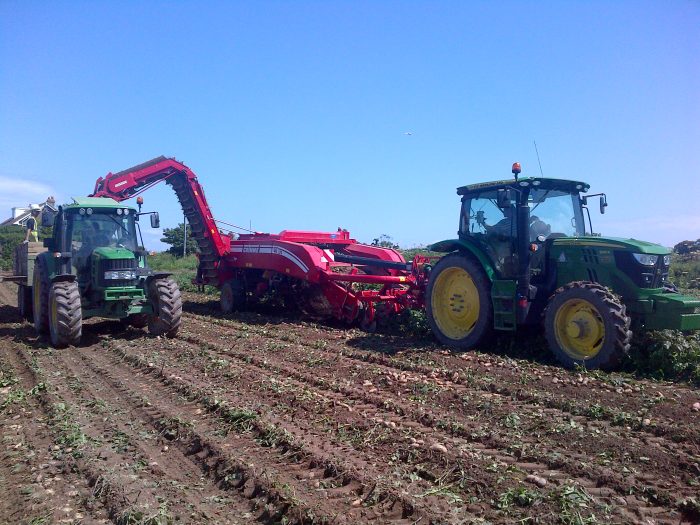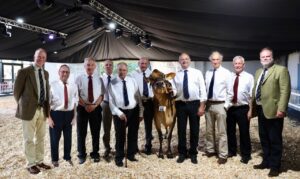
The annual Farm Jersey conference took place at La Mare Estate on 10 November. The following speech by the retiring president of the Jersey Farmers Union Economic, Peter Le Maistre, was one of the opening addresses:

When I spoke two years ago at the Farm Jersey conference for the very first time, it was a very stark warning to those in the room and in the Island that our agricultural industry was on a knife edge. I warned that unless we had more support, more farming businesses would close and the critical mass of our major components – potato and dairy – would be compromised. Although the support had increased from £1.8 million to £3.3 million, the figures were negated by the inexorable rise in the minimum wage. It was just enough to keep us going but confidence was disappearing quickly.
The Minister for Economic Development has been incredibly supportive but when he was unable to persuade his ministerial colleagues, we decided as a united industry, that we should approach a backbencher, Deputy Steve Luce, to fight our case in the States Chamber. Deputy Luce’s original proposition could not be supported by the Council of Ministers but again through the efforts of the Minister for Economic Development and the Infrastructure Minister, we thrashed out a compromise deal that was agreed by all parties.
Some of you here joined me in the States Chamber gallery on Tuesday to see 43 States members vote in favour, with one abstention. This is a huge moral boost for the industry, with not only short term immediate financial support, but with the reintroduction of the agricultural loans scheme, growers have the chance to make game changing investment for the future. Particularly important are the linking of support to the percentage minimum wage rise or RPI and also the recapitalisation of the Agricultural loans scheme will be a game changer.
For those unaware of what the scheme is, it was first introduced in 1974 to give young growers the chance to purchase land, build agricultural sheds and even houses. It was hugely successful. At a time when interest rates were over 12%, to be able to borrow at 6.5% made a huge difference. I myself bought my first agricultural field in December that year. Many of my contemporaries did the same and the 70s and 80s were times of great innovation and growth for the industry.
I was delighted that as we left the States Chamber gallery on Tuesday one dairy farmer told me there and then, ‘I am going to put in a new parlour’. Immediately confidence and stability has returned to that business. I hope that this renewed confidence will be repeated across the industry.
If we have the confidence to invest where will we invest? What are the areas that will bring increased productivity or profitability to our industry? Unfortunately, I missed the trial of the crop spraying with drones, but my son and nephew were both there and were amazed to see how impressive it worked on the steep côtils at Rozel. The JFU brought it up at a recent meeting with civil servants from the Environment Department and there are some obstacles in the way regarding the use of chemicals. Particularly, as not many chemicals at the moment have approval for air spraying.
For those not familiar with côtil spraying, one man and a drone will replace a tractor and driver and three staff – a huge increase in productivity and obviously saving costs.
The thought has occurred though that it could be used for reseeding. Two uses that spring to mind are grass on early slopes sown before you dig, which negates the need for any further field cultivation, or sowing cover crops to reduce soil compaction. The same company has a video sowing a cover crop into wheat before it has been harvested.
Another area where some of this extra aid can be targeted is to build back the Jersey Royal brand. In order to do this, a small group consisting of two growers, two civil servants, two marketing companies and Farm Jersey have been meeting for the past 12 months to decide if we want it to happen. WE DO! How is the best way to achieve it? This comes at an opportune moment. The two existing marketing companies are working ever closer together, and we are seeing new opportunities in mainland Europe. This is the time to put the Jersey Royal potato firmly back on the map.
Again, innovation will be the key to achieve any significant marketing of potatoes into Europe because of the Phyto-sanitary regulations. Our vice-president, Dougie Richardson, is leading the way in solving this problem. Will this be at last the decade where we break into Europe?
Regarding the dairy sector, robot slurry scrapers, sophisticated milking parlours, cow fit bits are now commonplace on most Jersey dairy farms. The real innovation here is occurring at the Dairy itself where new products are being developed, such as the development of Jersey Dairy Gelato ice cream in Scotland, but because the local milk sales are static, exports become increasingly important.
Another collaboration with a huge international company is Hotel Chocolat ice cream. The future sustainability of dairy farming in Jersey is dependent on export growth. Milk from the Jersey cow produces top quality products with unrivalled provenance. The Dairy team have a wealth of experience in quality control, marketing and logistics to sustain future export success.
Despite the disruption to world trade due to covid and the Ukraine war, Jersey Dairy exports have increased by 45% in the last 4 years, a truly impressive performance. I know that Eamon and the team at Jersey Dairy are busy looking at other new ideas too. Watch out for those! 5 Be it dairy or potato, we are exporting world class products which has to be a great advert for Jersey as a whole.
We talk a lot in recent years about the de-coupling of agricultural support from production to delivering public goods for public money, and quite rightly, farmers and growers are now rewarded for all the environmental work they do, which contributes greatly to what makes Jersey special. But at this very moment in time, I think the most important public good we can contribute to is food security.
Food security is now recognised by everyone as important. I was lucky enough to be given a copy of Joe Stanley book, Field to Fork. I will quote one passage from his excellent book: In 1927 the world population was 2 billion. Today less than 100 years later it stands at 8 billion. It is predicted to reach 10 billion in 34 years’ time. The scary message from Joe’s book is this: We will need to produce more food in those next 34 years than mankind has ever grown! That is why we need to make sure in the next five years that we make a real effort to supply every bit of local fruit and vegetables we possibly can.
Now, it’s not enough to get that message over to growers, they can grow but will the local supermarkets do their bit and stock it, and will you the local consumer purchase it, even if sometimes it is slightly dearer? Not that many years ago, would the general public have paid much attention to this? I doubt it. However, those empty shelves last January brought it home to many that food shortages are a very real concern.
In a similar vein, we recently attended the launch of the Government of Jersey Health Strategy where local fresh food has an important part to play. Also we should be doing more to get our locally grown food into school meals? Sometimes the reason for lack of supply is logistics or food preparation. Hopefully with this extra funding we can overcome those hurdles.
One of the areas where Jersey farmers can be immensely proud is the huge improvement in the quality of the raw water in Jersey streams. It has been a privilege to represent the JFU on the Action for Cleaner Water Group. At times, we have had to make recommendations that have been costly to you all, but for the greater good you have taken those recommendations on board. Whilst many gains have taken place there is still work to do and with the Water Catchment officer now in place, we will find new ways to improve water quality even further.
Of course, when it comes to the environment, hardly a week passes when most farms look at how they can reduce their carbon footprint. The dairy industry faces the biggest challenge here and at a recent conference we all learnt of ways to reduce methane emission. All members of Jersey Dairy are now signed up to Trinity Ag Tech. A couple of potato growers have done the same and I hope that more will follow. The Trinity Ag Tech platform firstly provides all those signed up their first year’s results. This is the start. Now you have in your control to alter small changes in your own farming practices to reduce your carbon footprint.
Of course, apart from reducing your carbon footprint, the Trinity Ag Tech data will enable you to add value to your product. With the success of the Action for Cleaner Water Group, I do wonder whether this is the time to set up an Action for Reducing Carbon group, on similar lines to include arable farmers, dairy farmers, civil servants. The key to success of the former has been the complete transparency at meetings. All sides have been able to explain their side of the story so that we all understand the others’ problems. This has always given the greatest clarity for us to find ways forward that work for all. I hope this is an area that we can build on.
Big decisions on an AD plant for slurry or more use of bio-fuel could bring big benefits to our industry in reducing our carbon footprint, if supported by Government. I would like to thank States Members and their colleagues for the support we received in the Assembly on Tuesday. I know that we can repay that support with the enthusiasm, enterprise and innovation from both young and old, new and established members.
We have two great export products – The Jersey Royal and the Jersey Dairy products. Also, don’t forget the cow itself, present in 100 countries worldwide. And the interest grows. Because of the Jersey cow’s recognised advantages in terms of its carbon footprint, more dairy farms are including in their herds.
There still seems to be some misunderstanding regarding how support is delivered. I can assure you that the industry itself is keen to see that support is targeted in areas that reward sustainability, entrepreneurship, and new entrants. It further encourages investment in better productivity and care for the countryside. I hope that at the next Farming Conference in 12 months’ time the farming sector can demonstrate the result of some of that investment, perhaps there might also be a view from a couple of new entrants and what they are doing and finally some evidence that we have increased local food production.
We started off asking for the same support as Arts and Heritage. But there is a fundamental link here: the old meaning of heritage – special or individual possession.
With the right support we can still be producing food in this field for many more generations. Agriculture is my family’s heritage. I believe it is all our heritage.




